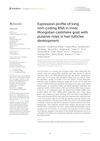 29 citations,
January 2017 in “Journal of Investigative Dermatology”
29 citations,
January 2017 in “Journal of Investigative Dermatology” The Msi2 protein helps keep hair follicle stem cells inactive, controlling hair growth and regeneration.
 14 citations,
January 2020 in “Frontiers in Endocrinology”
14 citations,
January 2020 in “Frontiers in Endocrinology” OCT4 helps granulosa cell growth in early-stage follicles, and FSH increases OCT4 through specific pathways.
 January 2018 in “Stem cell biology and regenerative medicine”
January 2018 in “Stem cell biology and regenerative medicine” The nucleus is key in controlling skin growth and repair by coordinating signals, gene regulators, and epigenetic changes.

Justicia procumbens extract may help prevent hair loss and improve hair thickness and shine in a type of hair loss condition.
 January 2024 in “Annals of Dermatology”
January 2024 in “Annals of Dermatology” Korean Red Ginseng may help protect hair from damage and promote growth.
16 citations,
April 2021 in “Frontiers in Cell and Developmental Biology” New hair follicles could be created to treat hair loss.
July 2024 in “International Journal of Molecular Sciences” The inhibitor DPP can promote hair growth.
 4 citations,
May 2018 in “Electronic Journal of Biotechnology”
4 citations,
May 2018 in “Electronic Journal of Biotechnology” All-trans retinoic acid at high doses harms goat hair growth cells and could be bad for hair growth.
 2 citations,
January 2017 in “Journal of Cosmetics, Dermatological Sciences and Applications”
2 citations,
January 2017 in “Journal of Cosmetics, Dermatological Sciences and Applications” TrichoTech™ may help hair growth and skin repair by increasing fibroblast growth and activity.
 1 citations,
January 2022 in “Cell Biology International”
1 citations,
January 2022 in “Cell Biology International” Changing CDK4 levels affects the number of stem cells in mouse hair follicles.
1 citations,
July 2022 in “British Journal of Dermatology” Targeting specific genes in certain pathways may help treat male pattern baldness.
 22 citations,
December 2013 in “Molecular biology of the cell”
22 citations,
December 2013 in “Molecular biology of the cell” ILK is essential for proper hair follicle development and structure.
December 2023 in “Animals” The study mapped yak skin cells to understand hair growth better.
 34 citations,
November 2010 in “Development”
34 citations,
November 2010 in “Development” Activating Notch in adult skin causes T cells and neural crest cells to gather, leading to skin issues.

Ganoderma lucidum extract may help treat stress-related hair loss.
 19 citations,
April 2015 in “European Journal of Pharmacology”
19 citations,
April 2015 in “European Journal of Pharmacology” Dihydrotestosterone (DHT) doesn't affect rat skin cell growth, but it does change cell cycle, protein levels, and other cell functions, potentially shortening hair growth cycle.
 359 citations,
January 2015 in “Cold Spring Harbor Perspectives in Medicine”
359 citations,
January 2015 in “Cold Spring Harbor Perspectives in Medicine” Hair growth phase and certain genes can speed up wound healing, while an inflammatory mediator can slow down new hair growth after a wound. Understanding these factors can improve tissue regeneration during wound healing.
 159 citations,
December 2007 in “American Journal of Pathology”
159 citations,
December 2007 in “American Journal of Pathology” Stress-related substance P may lead to hair loss and negatively affect hair growth.
 1 citations,
September 2022 in “The journal of investigative dermatology/Journal of investigative dermatology”
1 citations,
September 2022 in “The journal of investigative dermatology/Journal of investigative dermatology” MicroRNA-148a is crucial for maintaining healthy skin and hair growth by affecting stem cell functions.
 132 citations,
January 2017 in “International Journal of Molecular Sciences”
132 citations,
January 2017 in “International Journal of Molecular Sciences” Fat-derived stem cells show promise for skin repair and reducing aging signs but need more research for consistent results.
 13 citations,
October 2019 in “Journal of lasers in medical sciences”
13 citations,
October 2019 in “Journal of lasers in medical sciences” CO2 laser treatment for aging skin significantly changes immune system-related genes.
22 citations,
April 2017 in “Journal of Investigative Dermatology” Non-coding RNAs are crucial for skin development and health.
 1 citations,
February 2023 in “International Journal of Molecular Sciences”
1 citations,
February 2023 in “International Journal of Molecular Sciences” Melatonin improves cashmere goat hair quality by increasing follicles and reducing skin aging.
 5 citations,
August 2013 in “InTech eBooks”
5 citations,
August 2013 in “InTech eBooks” KLF4 is important for maintaining stem cells and has potential in cancer treatment and wound healing.

Deleting Smad4 and PTEN genes in mice causes rapid, invasive forestomach cancer.
 2 citations,
September 2022 in “Frontiers in veterinary science”
2 citations,
September 2022 in “Frontiers in veterinary science” Certain long non-coding RNAs are important for the growth of hair follicles in Inner Mongolian cashmere goats.
 January 2024 in “Journal of Biosciences and Medicines”
January 2024 in “Journal of Biosciences and Medicines” Future treatments for androgenic alopecia may focus on reactivating hair follicle stem cells and improving drug delivery.
16 citations,
March 2021 in “Frontiers in cell and developmental biology” A new method using Y-27632 improves the growth and quality of human hair follicle stem cells for tissue engineering and therapy.

Activin A promotes ear hair cell development, while follistatin delays it.
 1 citations,
February 2018 in “Madridge journal of dermatology & research”
1 citations,
February 2018 in “Madridge journal of dermatology & research” The plant extract remedy Satura® Rosta promotes hair growth and regrowth without negative effects.
























